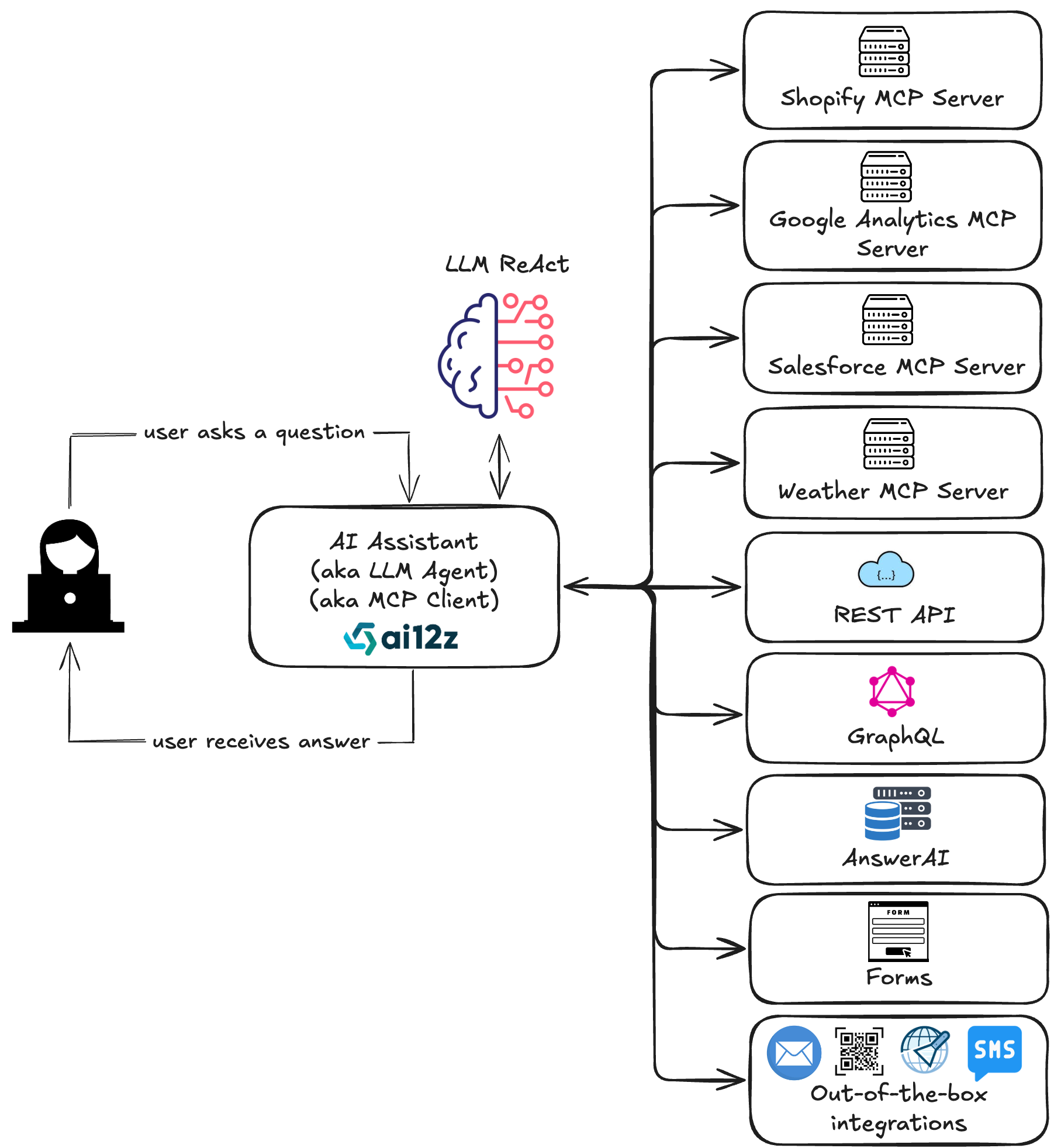Model Context Protocol (MCP) – Client
MCP unlocks integrations to AI

Most AI assistants today are limited to answering static questions or generating text. But to unlock their full potential, assistants need the ability to act — retrieving real-time data, submitting forms, and triggering backend workflows.
That’s where Model Context Protocol (MCP) comes in.
MCP is a new standard that allows AI models to interact with external systems like Shopify, Salesforce, Google Analytics, or your own APIs — in real time — using a unified, LLM-friendly format.
ai12z now supports MCP as a first-class integration type, alongside REST and GraphQL, allowing your digital assistant to become a fully functioning front-end for your business systems.
Why MCP Matters for Websites
Today’s website visitors want more than static answers. They want to:
- Get personalized product recommendations
- Check inventory or order status
- Locate nearby stores
- Submit appointment requests
- Ask about policies, pricing, or return options
- Sign up for newsletters or events
With MCP, ai12z-powered assistants can fulfill these tasks on the fly — connecting to your business systems, reasoning across steps, and delivering results conversationally.
What Is MCP?
MCP (Model Context Protocol) is a structured protocol that allows AI agents (LLMs) to:
- Access tools, APIs, and services via well-defined Actions
- Send and receive structured inputs and outputs
- Share context across multi-step workflows
- Integrate reasoning (ReAct) into decision-making
Each MCP "action" includes:
- A name and description
- Input schema (fields, validations, types)
- Output schema (expected result format)
- Optional UI hints (dropdowns, placeholders, required fields)
- Endpoint for execution
This structured design makes it easy for the LLM to understand the action, ask follow-up questions, and call services safely.
ai12z + MCP = Smarter, Actionable Assistants
Your ai12z Assistant acts as an MCP client (also called an LLM agent), capable of coordinating data retrieval and task execution across multiple MCP-compatible services.
Example Workflows
| Use Case | How MCP Enables It |
|---|---|
| 🛒 "Find me a lightweight hiking jacket." | Queries your Shopify store in real time via MCP → returns a product carousel. |
| 📦 "Where’s my order?" | Retrieves live order status from your eCommerce platform. |
| 📰 "Sign me up for the newsletter." | Collects input via a form → Sends to Salesforce via MCP. |
| 🗓️ "Book a bike tune-up tomorrow." | Triggers your scheduling system through MCP. |
REST vs. GraphQL vs. MCP
| Feature | REST / GraphQL | MCP |
|---|---|---|
| Primary Use | Data fetch/mutation | Real-time reasoning + action |
| Designed for AI | ❌ | ✅ Native LLM support |
| Handles multi-step logic | ❌ | ✅ ReAct-ready |
| Input/output validation | Manual | ✅ Schema-based |
| Tool chaining | Limited | ✅ Built-in |
| Developer effort | High | ✅ No-code UI configuration |
Benefits of MCP in ai12z
✅ No-Code Setup
Define integrations through a UI — no backend dev work needed.
🔁 Real-Time Data Access
Pull live data from CRMs, inventory systems, weather APIs, and more.
🔄 Seamless Tool Chaining
Use outputs from one MCP call as inputs for the next — enabling intelligent workflows.
🧠 LLM-Aware Structure
Provide LLMs with all they need (descriptions, examples, validations) to reason and act safely.
🧱 Scalable by Design
Create once, use across multiple projects and services without duplicating logic.
Getting Started with MCP
To use MCP in your ai12z Agent:
- Go to Integrations > Create New Integration
- Choose Model Context Protocol (MCP) as the type
- Define:
- Action name and description
- Input schema (field names, types, options, validation)
- Output schema
- Endpoint to call
- Click Save, then enable the integration in your Agent Settings
Your assistant can now call this integration in live user conversations.
Use Cases
- Ecommerce Copilots: Connect to Shopify, BigCommerce, etc., for product search, cart lookup, inventory status.
- Service Bots: Schedule appointments, trigger workflows, collect structured data.
- Customer Support: Check return status, answer policy questions, hand off to ticketing systems.
- Lead Capture: Convert users via forms that auto-submit to CRMs like Salesforce or HubSpot.
Conclusion
MCP turns your digital assistant into a smart, capable front-end for your business.
Rather than limiting your AI to static answers, MCP unlocks real-world utility: connecting your assistant with the live systems and workflows that power your business.
Ready to modernize your AI Assistant?
Enable MCP in your ai12z agent and bring live, actionable interactions to your users — no custom code required.